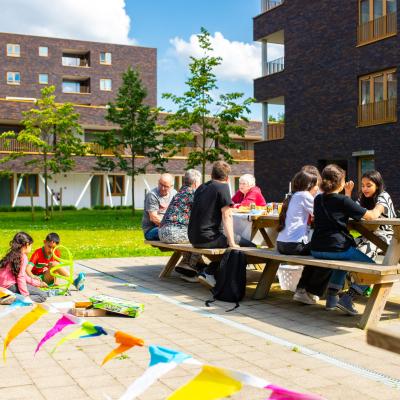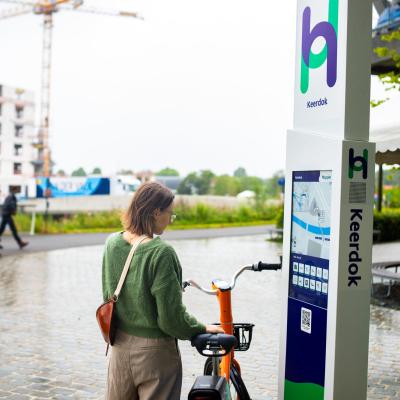As part of its general urban planning ordinance, updated in 2024, Mechelen is embracing innovative solutions to reduce car dependency, improve accessibility, and enhance the quality of life for its residents.
Car Sharing and Housing
A major change in the new regulations is the integration of shared cars into urban housing development plans. Mechelen now allows developers to replace traditional private parking spaces with car sharing services. This intervention aims to promote a modal shift from individual car ownership to more sustainable and cost-effective shared transport solutions.
In the city’s core shopping area, one shared car can replace up to seven private parking spaces. In suburban areas, this number drops to four. By increasing the availability of shared cars, Mechelen hopes to reduce traffic congestion, lower emissions, and encourage the use of alternative transportation methods.
Shared Bikes and Scooters
In addition to shared cars, Mechelen’s urban regulations are expanding to include shared bikes (electric and non-electric) and scooters. The focus on cycling and electric scooters aligns with the city’s commitment to promoting sustainable and active mobility. Moreover, the new framework supports the creation of mobility hubs, which will serve as centralized locations for shared bikes, scooters, and electric vehicles. These hubs will provide residents with easy access to sustainable transportation options, further reducing the need for private car use.
Parking Reductions and Flexibility
Shared mobility solutions are not only about vehicles themselves but also about rethinking how public space and parking are managed. The new regulations provide more flexibility in sustainable mobility solutions for new residential and commercial developments. With the availability of shared cars and bikes, developers can now reduce the number of parking spaces typically required in urban projects.
For example, where a building project might have previously needed to allocate significant space for private parking, the use of shared mobility options allows for a reduction in these requirements. This frees up space for other usage, such as green areas, playgrounds or residential units, while also supporting the broader goal of reducing car dependency in Mechelen.
Mechelen now allows developers to replace traditional private parking spaces with car-sharing services.
Hoppin Mobility Hubs
Adding to this, Mechelen is placing mobility hubs at strategic locations throughout the city in order to bundle the shared mobility offer. These hubs - branded as 'Hoppin' hubs in Flanders - provide residents with access to a variety of sustainable transport options, making it easier to choose green alternatives for their daily commutes or errands. Consequently, mobility hubs are expected to become key features in Mechelen’s cityscape, supporting the usage of sustainable and shared transport.
Collaborating with the Providers
Mechelen is also building partnerships with shared mobility providers to accelerate the city’s transition to sustainable transport. The urban planning regulations encourage collaboration with car sharing and bike sharing companies to ensure that shared mobility is well-integrated into the city’s transport network. By fostering cooperation with these providers, the city aims to enhance the availability, affordability, and accessibility of shared mobility options for all residents.
A Future-Proof Approach
Mechelen’s general urban planning ordinance marks a significant step forward in reshaping the city’s approach to mobility. By embracing shared cars, bikes, and scooters, as well as by reducing parking requirements and establishing mobility hubs, Mechelen is setting the stage for a more sustainable, accessible, and efficient urban transport system.
The integration of shared mobility into the city’s urban planning framework reflects Mechelen’s commitment to reducing its environmental impact, improving air quality, and creating a more livable urban environment. With these changes, the city is not only embracing the future of transportation but also creating a blueprint for other cities to follow in their transition to shared, sustainable mobility.
Learn more!
Mechelen’s general urban planning ordinance is available here (in Dutch).
Written by Steffie De Moor (Mpact)
Edited by Jelten Baguet (Mpact)




